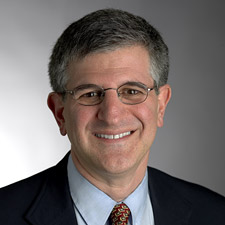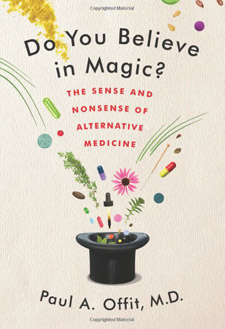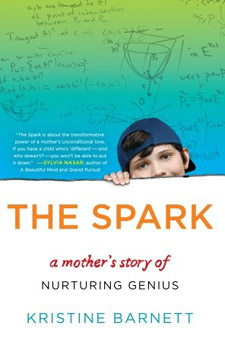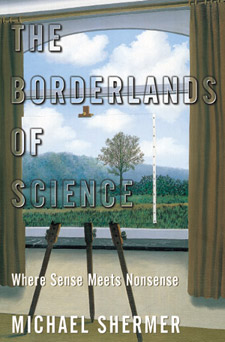In this week’s eSkeptic:

SKEPTICALITY EPISODE 215
Do You Believe In Magic?
This week on Skepticality, Derek interviews Dr. Paul Offit, who discusses his work in science-based medicine, from his time as a vaccine inventor to his tireless work educating the public about harmful medical fads and misinformation. His latest book, Do You Believe In Magic? is a scathing exposé of the so-called “alternative medicine” industry and gives insights into how to decide if a treatment is real, a helpful placebo, or just hogwash.
About this week’s eSkeptic
In this week’s eSkeptic, Dr. Chris Edwards examines some of the claims made by Kristine Barnett about her autistic savant son, James, in her book entitled The Spark: A Mother’s Story of Nurturing Genius.
Dr. Chris Edwards is a frequent contributor to Skeptic and the author, most recently, of Teaching Genius: Redefining Education with Lessons from Science and Philosophy (Rowman & Littlefield 2012). He is also the author of Spiritual Snake Oil: Fads and Fallacies in Pop Culture (Sharp Press 2011) and Disbelief 101: A Young Person’s Guide to Atheism (Sharp Press 2009) that has been translated into Polish.
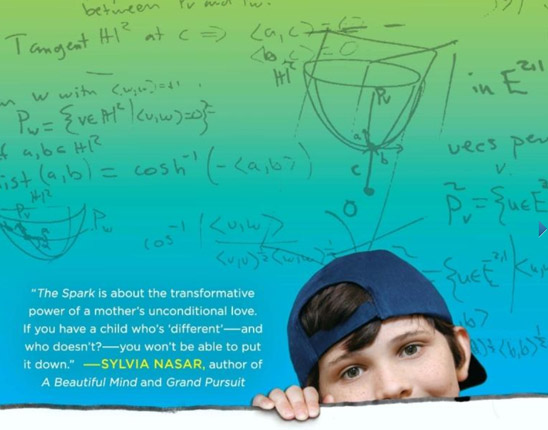
The Spark and the Hype
by Chris Edwards
Kristine Barnett’s son Jacob is autistic and he has become really good at mathematics at an early age. This much appears to be true, and it is not necessarily out of the ordinary for autistic savants, many of whom develop early propensities for unique skill sets involving numbers and music. But Jacob’s mother, who has published a book called The Spark: A Mother’s Story of Nurturing Genius (Random House, 2013) fails to provide any solid evidence that Jacob is anything more than a typical autistic savant (defined as someone with autism who also has a special skill set).1 The hype around Jacob—that he has created an original theory in astrophysics worthy of the Nobel Prize, that his IQ is higher than Einstein’s, and that his genius can only be nurtured in a university environment despite his young age—dissipates upon skeptical inquiry. Furthermore, the media attention surrounding Jacob reveals that many in the public still falsely view intelligence—and especially “genius”—as an inborn trait rather than as the product of intense intellectual effort.
It’s best to begin by systematically examining the remarkable claims that Jacob’s mother (and her publisher) makes about her son in her book. To begin, the book jacket flap claims: “At nine [Jacob] started working on an original theory in astrophysics that experts believe may someday put him in line for a Nobel Prize.” Kristine repeats that claim in the introduction by stating that, at age nine, “[Jacob] began work on an original theory in the field of relativity. The equations were so long they spilled over from his gigantic whiteboard onto the windows of our home. Uncertain how to help, I asked Jake if there was someone he might show his work to, and a renowned physicist I contacted on Jake’s behalf generously agreed to review an early iteration. He confirmed that Jake was indeed working on an original theory and also said that if the theory held, it would put him in line for a Nobel Prize.”2
Kristine repeats this later in the book, after she’s identified the renowned physicist as Dr. Scott Tremaine, a professor at Princeton. She writes “Dr. Tremaine got back in touch. He had taken a look at Jake’s equation, and he sent Jake an email with a list of books…. But he also wrote me an email. In it, he confirmed that Jake was indeed working on an original theory, and he made it clear that if Jake’s theory held, it would put him in line for a Nobel Prize.”3
Before revealing what Dr. Tremaine really wrote, it’s worth taking a moment to focus on that “s” that pluralizes the word “expert” on the book flap. Nowhere in the book or in any media coverage does anyone indicate that more than one expert looked at Jacob’s theory. A niggling point, perhaps, but not insignificant as scientific journals require peer review from a number of experts, and giving the impression that several people have confirmed the validity of a theory when they have not is not quite honest.
Kristine’s claims about Dr. Tremain’s reaction to Jacob’s theory are, at best, a misrepresentation. A March 20, 2011 article in the Indianapolis Star includes a partial text of Dr. Tremaine’s email: “I’m impressed by [Jacob’s] interest in physics and the amount that he has learned so far. The theory that he’s working on involves several of the toughest problems in astrophysics and theoretical physics. Anyone who solves these will be in line for a Nobel Prize.”
Clearly this is a statement about the significance of the problems that had sparked Jacob’s interests, not a commentary on the theory itself. Nowhere does Dr. Tremaine suggest that Jacob’s theory actually solves any problems. Besides, any student of the history of physics knows that predicting Nobel Prize winners is an iffy prospect at best, and that physics prizes tend to go not to theoretical constructs but research discoveries. Let’s not buy Jacob a ticket to Stockholm just yet.
In fact, when the reporter who wrote the article followed up with Dr. Tremaine, the professor stated only “I have seen a YouTube video in which Jake describes his theory, and I have spoken with his mother and corresponded with both her and Jake by email. I hope that Jake continues his interest in physics and mathematics.” This is hardly a solid validation of Jacob’s theory and it’s interesting to note that while Kristine liberally quotes from the conversations she has with professors and experts throughout the book, the actual text of the email she received from Dr. Tremaine does not appear in The Spark.
The second remarkable claim about Jacob involves the mystifying notion that Jacob’s IQ is higher than Einstein’s. This claim appears nowhere in the text of the book but is the first thing mentioned on the book flap, and appears in many of the media articles about Jacob.
In fact, one can also find this claim made about an Indian 12 year-old named Neha Ramu and a handful of other preteens.4 It’s not clear where the claim comes from since Einstein never actually took an IQ exam. For some reason, it is assumed his IQ would have been around 160 but it’s not clear where that number comes from or what criteria or measure would be used to calculate a number.
Let’s test the notion that Einstein must have had an exceptionally high IQ due to his historical work in physics. We do have IQ information on another of the 20th century’s titans of physics, that of Richard Feynman. In his biography of the man James Gleick writes that Feynman’s “score on the school IQ test was merely a respectable 125.”5 MENSA requires a score of 132 to enter, which means that even those sub-geniuses who miss the cut off for entry by six points can still console themselves with the idea that they have a higher IQ than Richard Feynman!
Okay, here’s the baffling thing. Kristine writes that “Jake had scored 170 on the Wechsler Fundamentals: Academic Skills achievement test, which measures broad skills in reading, spelling, and math. The normal range is between 90 and 109, superior between 110 and 124, and gifted between 125 and 130. Scores about 150 fall into the category of genius.”6 The Wechsler test, typically, is given to kids between the ages of 6 and 16. What does it mean to say that Jacob, or any other kid, has an IQ higher than Einstein on an intelligence test meant for children and adolescents? Does this mean that we assume that a 10-year old Einstein would have scored 160 on the test or are we assuming that a 30 year old Einstein would score a 160 on the test? How exactly can we compare anybody’s results on an IQ test with Einstein’s when the man never had his IQ tested? Can I also assume that his SAT score would be 1000, and then assume that I scored “better than Einstein” on the exam?
Thirdly, much of the narrative in The Spark involves Kristine trying to find an academic place for her autistic son and, finding public schools inadequate, has to locate a place for him at the local college campus. At this point, I should disclose that I teach Advanced Placement World History at a high school not far from where Jacob now attends university in central Indiana. The Indianapolis area provides ample opportunities for gifted students to engage in mathematics competitions.
It is a bit curious that Jacob does not attend these events, especially given that he would likely find intellectual comrades there. Kristine writes that she did not want Jacob in the math club because it would take up all of their Saturday mornings. She writes that after her first trip to a math team practice, that “Five hours later, I realized that this math club would mean that Jake would have to give up every Saturday to sit in a stuffy basement classroom with a bunch of kids doing math.” Because of this, she kept Jacob out of competitions. Then she indicates that Jacob’s intelligence would have made his entry into competition unfair, by writing “He’d found a sample Mathematical Olympiad problem set online the night before and had stayed up until two in the morning blowing through it for fun. It hadn’t been a challenge for him, and he didn’t want to take a win away from any of the kids who’d been studying so hard to get into the competition. ‘They’re all trying really hard, Mom. It’s not fair’.”7
Being a teacher, I see how hard our math competitors work, and how impressive their achievements can be in competition, but I suspect there’s probably something else going on here, not to mention that this attitude is more than a little condescending. Speaking of this, most of Kristine’s narrative involves her trying to find an academic environment where Jacob’s needs could be met. She meets this laudable goal when a Dr. Russell at Indiana University/Purdue University Indianapolis requested that Jacob join a collegiate program called “Special Programs for Academic Nurturing” or SPAN.8 Kristine asks rhetorically, “Would we consider pulling Jake out of elementary school and sending him to college?”9
The image of an elementary aged child in a college course has done much to enhance Jacob’s mystique, but is it really that big of a deal? Anyone with a student in a modern high school, for example, knows that almost all secondary schools in the suburbs are high school/college hybrids. I myself teach an Advanced Placement World History course to mostly high school freshman, which is a college class where students can earn college credits if they score well on a federal exam. The class is harder than anything I took even in graduate school (the notion that university programs provided greater rigor than high school has recently been debunked by an important book called Academically Adrift: Limited Learning on College Campuses) and a few years ago a student took the course and got the highest possible score on the exam at the age of 12.10 Nobody called the newspapers.
In addition, I frequently act as a faculty advisor for students in the International Baccalaureate program. In order to graduate, students have to produce an original piece of work similar to the type of work that Jacob likely engages in as a “paid researcher” for IUPUI, another of the claims lauded on the book flap. My point is that this type of work is hardly out of the ordinary for “regular” high school students in advanced programs.
The Amadeus Myth
I’m a teacher and the father of two young sons. While neither of my children has any developmental issues, brain cancer nearly killed my youngest boy and only relented after a succession of surgeries and radiation treatments (he’s now two years in remission.) I sympathize with Kristine and know the gut-wrenching feeling that comes with worrying about the fate of your children. In addition, it is clear that young people need to be lauded more for intellectual accomplishments (as opposed to athletic), and I do wish it was the case that math prodigies and scientists received more public recognition. But the attention heaped on Jacob Barnett, because it feeds into media-generated myths about genius, may do more harm than good.
In his analysis of genius in The Borderlands of Science, Michael Shermer calls the child-genius concept “the Amadeus Myth” and defines it as “the belief that genius and original creations are produced by mysterious mental miracles limited to a special few. Its source is ancient, dating back to the ancient Greeks who believed that the Muses, or gods, breathed creativity into certain individuals.”11 The prime example of a child touched by the spark of the muses is Wolfgang Amadeus Mozart, and Dr. Shermer exposes this story as a myth.
Two new misconceptions seem to be currently tied in with the Amadeus Myth. The first is that a high IQ equates with genius. I sometimes tell my Ivy League bound students to not make the mistake of having gone to school without having done a great thing. The same principle applies for the concept of IQ. Having a high IQ might indicate that someone is more likely to create a work of genius, but it does not define someone as a genius. Compare Richard Feynman, with his 125 IQ who created works of genius that earned him the Nobel Prize, with Marilyn vos Savant, the woman who famously has the world’s highest IQ, and whose major intellectual contributions is writing an “Ask Marilyn” column in the Parade magazine insert that comes with the Sunday paper. Who did work worthy of genius?
Perhaps because higher level mathematics remains incomprehensible to most people, there is a tendency to ascribe genius to individuals who can work at deep levels of mathematical theory. But does mathematics really deserve such a lofty place in the intellectual Valhalla? No less an intellect than Edward O. Wilson recently argued most mathematical theorems are actually translations from already existing scientific and philosophical theories.12 Einstein thought in pictures and metaphors, for example, then translated those concepts into mathematics. With a slew of talented science writers currently churning out books written in plain language, people with poor math understanding are hardly barred from the world of theoretical physics or biology.
In his article, Dr. Wilson noted that Charles Darwin, for example, was more or less inept at math. Jacob’s mathematical skills are no doubt impressive, but his skill set is more akin to playing a violin at the top level than it is to creating a work of genius. Violin players learn to carefully play already existing pieces. Kristine seems to understand that a new theory is necessary to confirm Jacob’s “genius,” hence the hype over his supposedly original theory. But that theory has not been put through the rigor of peer review and, therefore, does not yet count.
In public perception, high IQ plus mysterious mathematical talents plus the image of a young person at the university plus very spurious claims about a potentially Nobel Prize winning original theory all feed into the preexisting Amadeus myth. This helps to explain the media’s interest in Jacob. Add to this Jacob’s autism, and the controversies surrounding that topic, and you have a marketing phenom. What we don’t have is a body of work to judge.
You see, to be a genius is to produce a work of genius. Genius is as genius does. In his book of biographies about geniuses, Harold Bloom describes his test for genius by asking “has my awareness been intensified, my consciousness widened and clarified? If not, then I have encountered talent, not genius.”13 Works of genius in the sciences are defined by one’s peers. Take the example of the modern genius Grigory Perelman, a Russian mathematician who proved the Poincare Conjecture in the year 2000. Masha Gessen, who wrote a book called Perfect Rigor: A Genius + The Mathematical Breakthrough of the Century about Perelman details many features of the man that parallel Jacob.14 Perelman, for example, was both a math prodigy and almost certainly is autistic. But Perelman never shied from mathematics competition as a youngster. And he spent eight or nine years, as an adult, in relative isolation to create his work of genius.
When Perelman finished his work; he was nearly 40 years of age and then he presented his original theory to a community of experts and traveled to the United States in order to explain himself. People in his field reviewed Perelman’s life work with rigor, declared it valid, and he was offered a million dollar reward for his efforts. (Perelman declined to collect the money.) Even with a mathematical gift, it took half a lifetime of effort for Dr. Perelman to create a work of genius. Terms like “original theory,” “genius” and “Nobel Prize” should not be flippantly thrown around, and I’m not sure had Dr. Perelman been lauded as a teenager for his early achievements that he would have had the fortitude to overcome the many obstacles he needed to create his impressive work.
In my own book on education—Teaching Genius: Redefining Education with Lessons from Science and Philosophy—I intended to demystify the concept of genius and to try and find lessons from great thinkers that can be applied in the classroom.15 As Grigory Perelman’s example indicates, and as Michael Shermer and others have written, works of genius are the products of thousands of hours of study and intellectual work. Kristine Barnett and her publisher have taken an autistic boy with a talent for mathematics and, by misrepresenting the emailed words of a single physicist, by comparing Jacob’s IQ to Einstein’s non-existent score, and by overstating the importance of his placement at a university, have hyped him into a genius.
Real genius requires thousands of hours of potentially fruitless effort. Then the product of such efforts must be put through rigorous peer review and exposure in the marketplace of ideas. Let’s hope that the hype surrounding Jacob doesn’t suck the air away from his spark. Let us also hope that that the misconceptions expounded by his example do not smother the sparks of others. ![]()
References
- Barnett, Kristine. 2013. The Spark: A Mother’s Story of Nurturing Genius. New York: Random House.
- Ibid., xiii.
- Ibid., 210–211.
- Kingkade, Tyler. 12-Year-Old Indian Girl Neha Ramu Has Higher IQ Than Einstein, Hawking. The Huffington Post.
- Gleick. James. 1992. Genius: The Life and Science of Richard Feynman. New York: Vintage Books.
- Barnett, 192.
- Barnett, 198–199.
- McFeely, Dan. Genius at Work: 12 Year Old is Studying at IUPUI. March 20, 2011. The Indianapolis Star.
- Barnett, 188.
- Arum, Richard; Roksa, Josipa. 2011. Academically Adrift: Limited Learning on College Campuses. Chicago: University of Chicago Press.
- Shermer, Michael. 2001. The Borderlands of Science: Where Sense Meets Nonsense. Oxford: Oxford University Press, 263.
- Wilson, Edward O. 2013. “Great Scientist Does Not Equal Good at Math: E.O. Wilson Shares a Secret: Discoveries Emerge From Ideas, Not Number Crunching.” Wall Street Journal, April 5.
- Bloom, Harold. Genius: A Mosaic of One Hundred Exemplary Creative Minds. 2002. New York: Warner Books, 12.
- Gessen, Masha. 2009. Perfect Rigor: A Genius +The Mathematical Breakthrough of the Century. Boston: Houghton Mifflin Harcourt.
- Edwards, Chris. 2012. Teaching Genius: Redefining Education with Lessons from Science and Philosophy. Lanham: Rowman and Littlefield.


